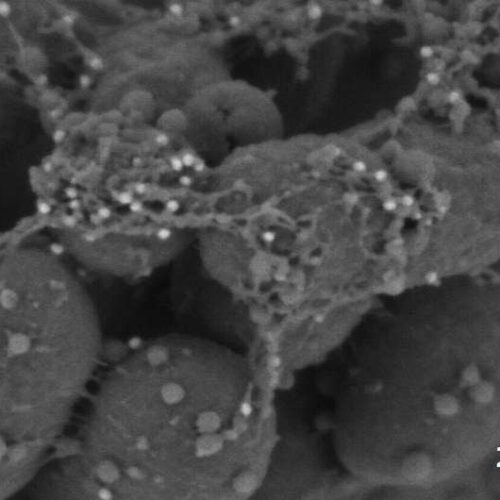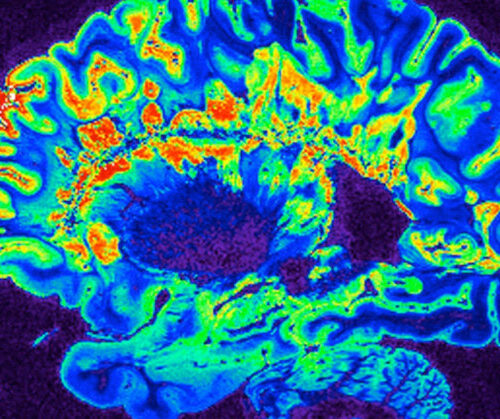UNIVERSITY OF OTAGO A simple eye test may make diagnosing the earliest stages of ‘diseases of old age’ possible when people are much younger, University of Otago researchers hope. Parts of our retina have previously been proposed as biomarkers for Alzheimer’s, but researchers from Otago’s Dunedin Multidisciplinary Health and Development Research Unit have been investigating...
Tag: <span>Alzheimers</span>
A protein present in the gums may help prevent Alzheimer’s
by Béatrice St-Cyr-Leroux, University of Montreal Colloidal gold immunostaining (white beads) for the SCPPPQ1 protein visualized by scanning electron microscopy, showing the intimate interaction of the protein with P. gingivalis bacteria. Credit: University of Montreal A research team affiliated with the Faculty of Dentistry at the University of Montreal has shed new light on a...
Brain damage markers greater in people with severe COVID-19 than those with Alzheimer’s
Healthcare worker Demetra Ransom comforts a person with COVID-19 at United Memorial Medical Center in Houston, Texas, on December 4, 2020. MARK FELIX/Getty Images A study demonstrated that participants hospitalized with COVID-19 experiencing neurological complications had higher levels of blood proteins or biomarkers associated with neurological damage than people with Alzheimer’s. Increased biomarker levels correlated...
ADHD DRUG MAY PROTECT AGAINST ALZHEIMER’S NEURODEGENERATION
Boosting levels of the neurotransmitter norepinephrine with atomoxetine, a repurposed ADHD medication, may be able to stall neurodegeneration in people with early signs of Alzheimer’s disease, according to a new study. The results appear in the journal Brain. This is one of the first published clinical studies to show a significant effect on the protein tau,...
Stalled Alzheimer’s drug may find new purpose against superbugs
By Michael Irving January 12, 2022 Researchers have repurposed an experimental Alzheimer’s drug to fight antibiotic-resistant bacteria credit: ktsdesign/Depositphotos Our antibiotics are failing in large numbers, threatening a future “dark age of medicine” where once-simple infections become lethal again. A team of scientists has now found a way to restore common antibiotics to their former...
Developing a ‘fingerprint’ test that could diagnose Alzheimer’s early
Interview conducted by Emily Henderson, B.Sc. Jan 11 2022 Thought Leaders Dr. Cynthia McMurray Senior ScientistLawrence Berkeley National Laboratory In this interview, we spoke to Dr. Cynthia McMurray about her latest research into Alzheimer’s disease and how she has developed a ‘fingerprinting’ technique that may help to diagnose Alzheimer’s before symptoms begin to appear. Alzheimer’s...
Experimental treatment prevents Alzheimer’s-associated weight gain in mice
FUNDAÇÃO DE AMPARO À PESQUISA DO ESTADO DE SÃO PAULO Treatment with a bile acid derivative known as TUDCA (tauroursodeoxycholic acid) can mitigate metabolic abnormalities associated with Alzheimer’s disease, such as alterations in food intake and body weight, improving the patient’s quality of life, according to the findings of a study conducted at the University...
Stroke drug shows promise in treating Alzheimer’s and dementia
by University of Southern California Credit: Pixabay/CC0 Public Domain A human stroke drug, fast-tracked by the Food and Drug Administration and soon entering Phase 3 clinical trials, shows intriguing signs that it might also be a safe and powerful defense against Alzheimer’s and other forms of dementia. A new study published Tuesday in the Journal of Experimental...
Nasal Alzheimer’s Vaccine To Start Human Trials for the First Time
Ameya Paleja Brain MRI scan NIH Image Gallery/Flickr Brigham and Women’s Hospital in Boston Massachusetts will soon begin Phase I trials of a nasal vaccine designed to prevent or slow the progression of Alzheimer’s disease (AD), a press release said. This is the first occasion when a nasal vaccine is being attempted for the disease, which...
Iron deficiency plays an important role in Alzheimer’s
Alzheimer’s disease is the leading global cause of dementia. Sadly, this neurodegenerative disease has no known cure and it is in the cards for millions of ageing people. A good effective treatment is not even in sight yet, because scientists don’t fully understand the causes. However, researchers at the University of Adelaide now have evidence...






